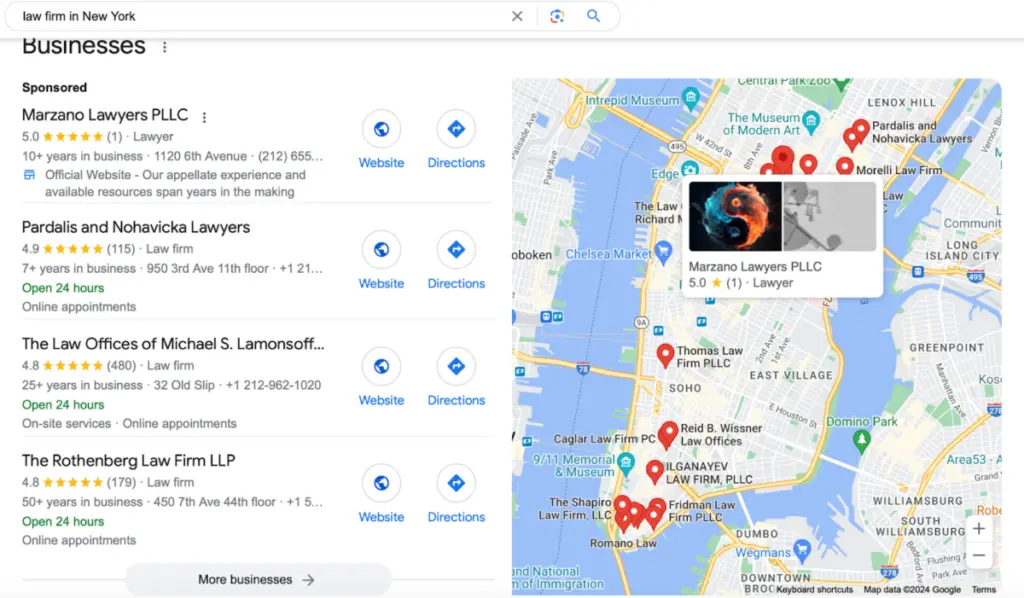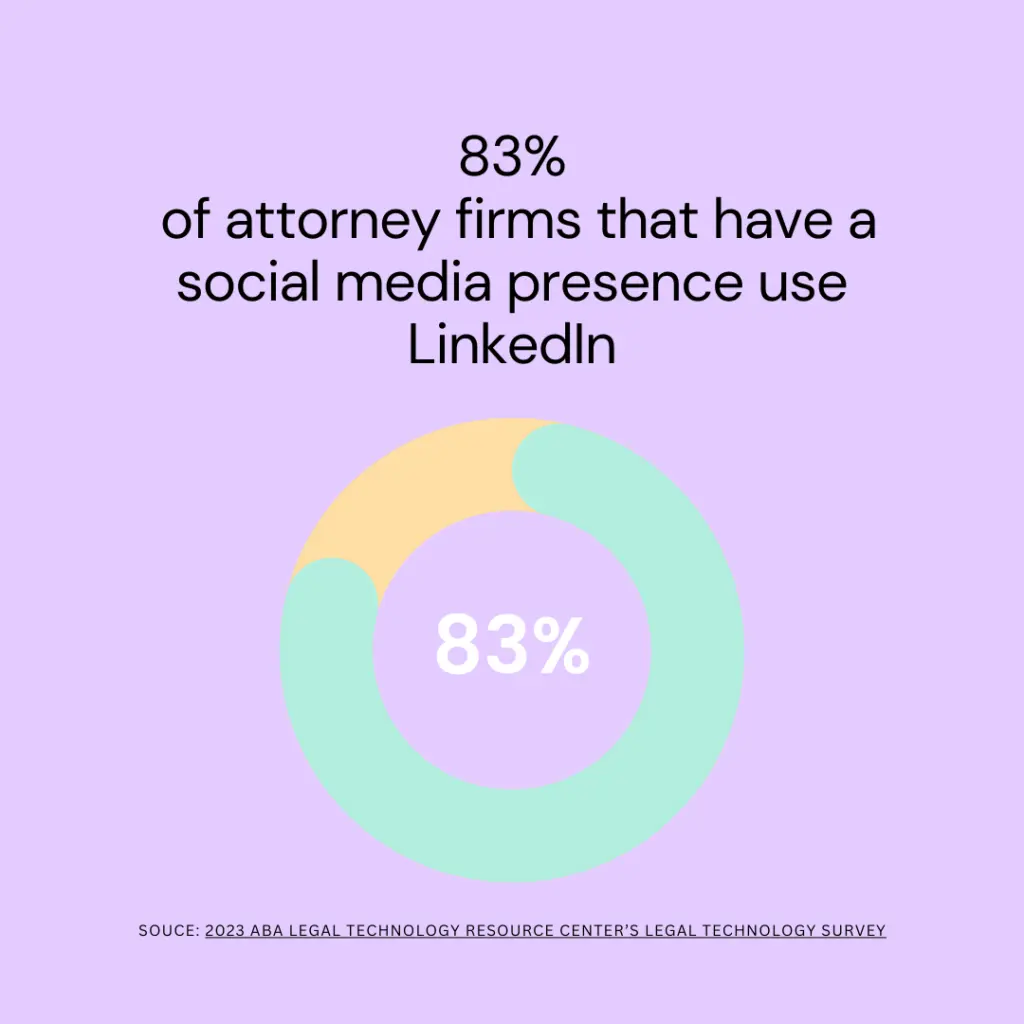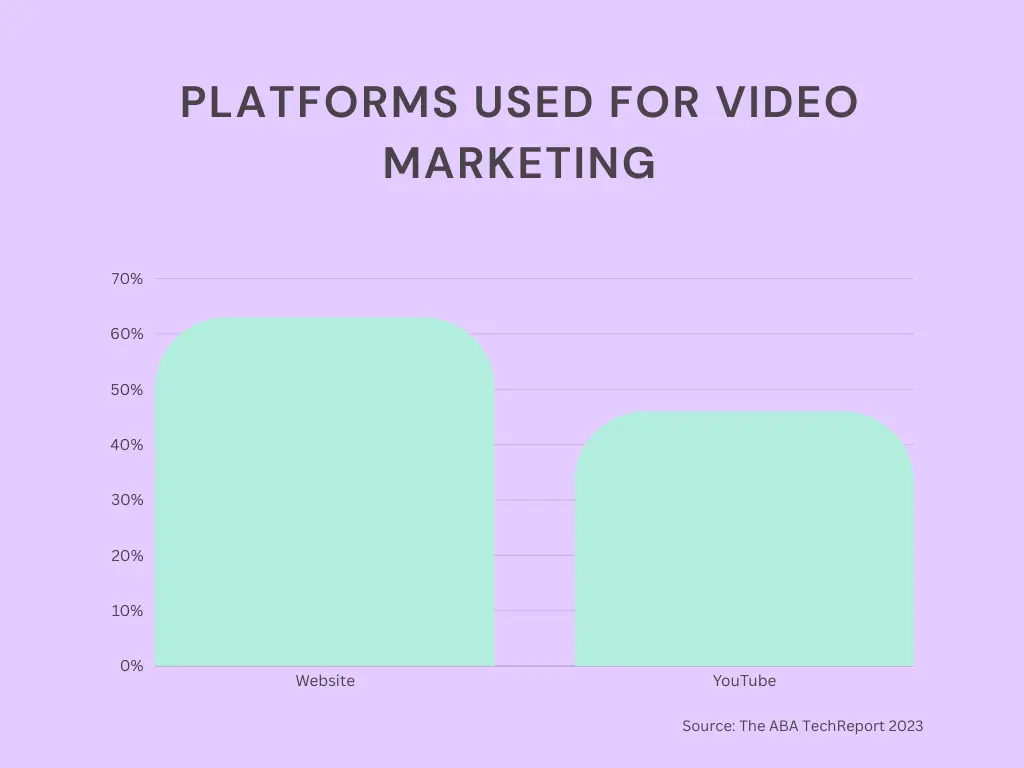If you come to think about it, attorneys are actually glorified marketers. Put simply, they need to “sell” their client’s innocence. This means that they need to focus on traits that show their client’s good side and downplay problematic areas, all while also keeping track of what the other side is up to.
However, marketing a law firm requires a different set of skills and strategies. Instead of having to convince a small jury pool, there’s virtually an endless list of clients who need convincing. They’re also up against more than just one “defense team” with countless other firms going for the same clients.
Whether you’re looking to market your own firm or a marketing agency wanting to add the legal industry to your list of industries served, these are the areas to prioritize.
Marketing Tips for Attorney Firms
The 2023 ABA Legal Technology Resource Center’s Legal Technology Survey found that when attorney firms were asked how confident they were about the effectiveness of their firm’s marketing, shockingly only 9% were very confident. Here’s how to change that:
1. Create a secure, mobile-friendly website
It’s not good enough just to design a website. With the growing number of AI-powered website builders available, anyone can have a website up and running in less than a day.
When designing a website for a legal firm, the emphasis is on security and mobile optimization. The website will be used to capture information. This means that you’ll need to ensure that text fields are big enough and that the information will be protected.
What’s concerning, though, is that the 2023 ABA Legal Technology Resource Center’s Legal Technology Survey found that less than half of attorney firms use SSL security for their website. While more have optimized their website for mobile devices, still about a quarter of websites aren’t.
So, if you can start by putting in place sufficient security and ensuring that the browser experience is seamless across mobile, you’re already ahead of many other firms. Plus, between 2022 and 2023, 10% more firms reported retaining clients via their website, making website design a key area to invest in.
2. Include a chatbot on your website
The average Joe doesn’t have the personal phone number of his lawyer on speed dial. For after-hours legal emergencies, he needs to settle for Google’s advice.
Adding a chatbot feature to an attorney firm’s website can offer that sense of personal, one-to-one interaction when it’s much needed.
For law firms, it’s also a way to keep potential clients longer on the website, reducing the bounce rate. Most chatbots ask for an email address if a conversation gets interrupted, making it a great way to generate leads too.
Lead generation aside, it also serves as a tool to lessen the workload of paralegals. You can, for example, set it up in such a way that it gets answers for questions you’ll typically ask in your intake form.
The time saved can be used for other marketing activities like writing blog posts or social media content, activities that better serve assistants’ legal knowledge. As employees have industry knowledge, they're the best ones to help with content creation.
That said, it doesn’t have to be reserved to answering basic questions. If you have a blog (which is highly recommended), you can redirect clients to specific articles that will address their issues.
3. Use landing pages
Landing pages serve a different function to the website and are designed to focus on getting visitors to complete a specific action like:
- Booking a consultation
- Subscribing to your email newsletter
- Registering for a webinar
It’s commonly used to convert traffic from ads. For example, if you’re running a paid ad campaign to advertise legal aid for road accident victims, redirecting clicks to a dedicated landing page about this service will get you more conversions than your home page.
The same principle can be applied to organic search traffic. The landing page should align with the specific service for which you’re ranking organically.

Source: dribbble.com
When designing landing pages for an attorney firm, check that you include the following essential elements:
- A compelling headline about a pain point that the firm can solve
- A mobile-friendly layout
- One clear call to action like a button visitors can click to book a consultation
- Trust signals like a testimonial or logo of a long-standing corporate client
The key takeaway when designing a landing page is to keep it simple. Focus on one action. If you include a form, restrict the number of required fields.
4. Create and optimize your Google Business Profile
A Google Business Profile (formerly called Google My Business) can serve multiple purposes. It takes it one step further than simply growing your visibility by building a trustworthy and credible image.
Trust is foundational in this industry. Not only are clients expected to divulge personal information, but their future also depends on their attorney’s capabilities.
The nature of the relationship between attorneys and their clients also call for face-to-face interaction. The 2023 ABA Legal Technology Resource Center’s Legal Technology Survey reveals that nearly half (45%) of attorney firms rely on face-to-face interaction to communicate with clients. This makes local SEO a priority.
Law firms can optimize their Google Business Profile by:
- Ensuring all the key info is added including the name of your firm, physical address, phone number, business hours, and website address
- Highlighting specialization areas like family law, intellectual property, real estate etc.
- Adding a photo of your office, partners, and receptionist
- Responding promptly and sincerely to all reviews
- Updating your profile regularly (immediately if a key detail like your business hours or phone number has changed)
5. Grow your brand on LinkedIn
LinkedIn is the leading social media network for attorney firms. The vast majority (83%) of attorney firms that have a social media presence use LinkedIn, according to 2023 ABA Legal Technology Resource Center’s Legal Technology Survey.
What makes it so great for this industry is that you can grow the attorney firm’s own brand as well as the personal brand of its legal practitioners. You can then also cross-post to share posts from the firm’s LinkedIn business page to employees’ personal LinkedIn pages and vice versa.
Add a couple of hashtags to boost the visibility of your posts. According to eClincher, rated as one of the top tools for social media management, the top-ranking hashtags for lawyers are:
- #law
- #lawyerlife
- #lawtech
- #lawstudents
- #lawyers
Depending on the post, you can also incorporate other top LinkedIn hashtags like:
- #innovation
- #management
- #motivation
- #entrepreneurship
- #HumanResources
- #PersonalDevelopment
- #leadership
In addition to creating your own content, also take the time to respond to others’ posts. Keep the comments authentic and refrain from using every comment as a chance to pitch our legal services.
Joining relevant LinkedIn groups is another avenue that you can use to engage with potential clients and your peers. Engagement aside, it will give you insight into which areas your target audience has the most questions about and stay up to speed with best practices.
Encouraging employees to participate on social media, specifically LinkedIn for attorney firms, remains one of the best employee advocacy tactics. However, it’s key that you create a policy and ensure that employees actually know about it. Nearly half of attorneys (49%) that participate on social media for professional purposes don’t know if the firm has a policy about social media use.
6. Establish employees as thought leaders
While attorneys need to think outside of the box at times, the career calls for a lot less creativity. In this industry, reputation carries significant weight. Being regarded as knowledgeable by clients and peers will help to grow the firm.
To show that the team are experts and reliable resources, they’ll need to share advice. It might sound counterintuitive considering that you’re getting paid for your legal knowledge, but you first need to build trust.
You have two main options: writing content and speaking at events.
You can write articles that you share on the firm's blog or even personal blog. Blogging, whether it’s in personal capacity or as part of the firm’s official website, is a necessity. Nearly a third of attorney firms have retained clients via the firm’s blog, while 53% retained a client via their own personal blog, according to the ABA TechReport.
If you prefer speaking over writing, you can explore podcasts or speaking at an event. You also have the option of creating videos. It’s a popular format that only 30% of firms use. Those that do use videos mainly post it on their own website (63%) or YouTube (46%).
Other channels that you can explore for posting videos include your landing page, emails or even Facebook. After LinkedIn, Facebook is the other main social media channel used by this industry.
7. Organize events
As mentioned earlier, establishing rapport and building a solid relationship is critical in this industry. Yes, that client lunch or round of golf is well justified to nurture client relationships. However, you’ll also need to organize bigger, in-person events from time to time in addition to these one-on-one encounters. It presents the ideal opportunity to strike up new connections and strengthen existing ones.
Here, you also have two options: keep it social or add an educational element.
Educational events like a workshop about copyright law can also serve as a platform to exhibit your expertise. The goal is to provide real, practical value instead of delivering a sales pitch.
Newer and smaller law firms can partner with another business to attract more attendees. For example, if you decide to present a workshop on copyright infringements, you can partner with a publishing house.
Social events, on the other hand, can be an opportunity to showcase your benevolence. You can, for example, host an auction where proceeds will go towards a local charity.
8. Add a QR code to your marketing material
What makes it such an attractive tool for marketing is that it bridges the gap between physical spaces, traditional marketing and the digital world. As you would’ve noticed, attorneys need to be present in both.
From business cards to brochures, QR codes can be incorporated into a variety of marketing materials. Upon scanning the code, potential clients can be redirected to:
- A digital business card
- Landing page
- Exclusive content and lead magnets like a downloadable checklist
- CVs of individual attorneys
- Recent press mentions
- Contact forms
One of the big benefits of QR codes is that it enables real-time tracking of a marketing campaign’s effectiveness. At the end of the day, tracking remains one of the best ways to know if your marketing efforts are paying off.
Key Takeaways
Marketing attorney firms call for a combination of digital and more traditional strategies. While they should have an online presence, their services are still rendered in person.
This means that your marketing campaigns must create opportunities for face-to-face interaction. Not only are in-person events an opportunity to network and create rapport, but it can also be a platform to present yourself as a thought leader.
A second key takeaway is to do the basics, but ensure that you do them really well. Websites, blogs, email, and social media remain the ways that firms retain clients.
Frequently Asked Questions
Which are the leading law firm website design companies?
According to sources across the web, the following website design agencies have a proven track record when it comes to creating websites for law firms:
- Online Optimism
- Digital Silk
- Lounge Lizard
- Scorpion
Which are the best SEO agencies for attorney firms?
According to sources across the web, the following SEO agencies have generated great results for the legal industry:
- SmartSites
- Thrive Internet Marketing Agency
- LawRank
- Neon Ambition
- MeanPug Digital
How much do SEO services for attorney firms cost?
Depending on the size of the firm, its market’s level of competition, and project’s scope, you can expect to pay anything between $500 and more than 10 times that. For example, basic services for small firms typically range between $500 and $2,000 per month and include services like on-page optimization, content creation, and local SEO. For advanced services like extensive keyword research, technical SEO, and ongoing analytics and reporting, you’re looking at between $5,000 and $10,000 per month.
Should attorneys use social media to market themselves?
Yes, social media marketing can also be used by the legal industry. LinkedIn, in particular, can generate great results. You can use it to grow your own personal brand and that of your firm. If you’ll be using it to market your attorney firm, just ensure that you also create posting guidelines for other attorneys.
Which marketing strategies are used for marketing attorneys?
A secure, mobile-friendly website remains the primary way that attorneys get new clients. In addition to website design, also invest in SEO to help it rank higher and a chatbot to optimize user-friendliness. Content marketing is also effective. Attorneys need to establish trust and credibility and blogging and video marketing can help with that.







